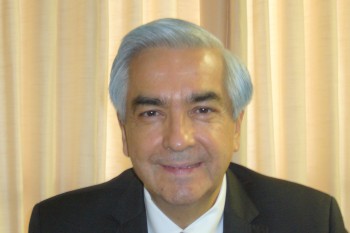Events

February 2018
H. E. Mr. Carlos Fernando Almada, Ambassador of the United Mexican States
UPDATE: Feb 13, 2018
Welcoming New-Field Investments and More Japanese Corporations to Mexico
— Japan and Mexico have an exchange history of over 400 years. How do you see the development of Mexico-Japan relations?
The relationship has always been positive. And I am very optimistic about its future as well. The two countries have been in contact starting with a curious incident from a long time ago. A Spanish ship was wrecked, and the passengers, some of whom were Mexicans, were rescued by the people of Onjuku in 1609. After Japan’s seclusion policy ended, the Japan-Mexico Treaty of Amity, Commerce, and Navigation was concluded in 1888, which was the first equal treaty for Japan and the beginning of the diplomatic relationship between the two countries. In 1897, the first organized Japanese immigration to Latin America arrived in Mexico. Japan signed an Economic Partnership Agreement (EPA) for strengthening the relationship in all sectors of the economy, with Mexico in 2004 after the one with Singapore. After the Japan-Mexico EPA was signed, the number of Japanese companies doing business in Mexico has more than tripled, which is a real success story.
— As Mexican Ambassador to Japan, what is your priority mission for further strengthening the bilateral ties? This year will mark 130 years of diplomatic relations between Mexico and Japan. What kind of celebratory events are you planning?
The bilateral exchanges and cooperation have expanded in the political, economic, commerce, academic, cultural, and all other areas. We now have 1,111 Japanese companies established in Mexico. And our priority is to secure them a positive and fruitful operation, and to expand the figure and invite investments into new fields including infrastructure, energy, domestic consumption, aerospace, and pharmaceuticals. Japan and Mexico are in a mutually complementary relationship and are important partners to each other, and positive about TPP11. For commemorative events in 2018, we will have some lectures about the Japan-Mexico Treaty of Amity, Commerce, and Navigation and intend to publish articles about it, both in Tokyo and Mexico City.
— Would you tell us the current economic situation in Mexico?
The economy is stable and growing. The inflation and unemployment have diminished, and we expect the growth of 2.5% for 2017. Since the 1990s, Mexico has been pursuing the economic policy of macroeconomic discipline in order to improve the competitiveness of the country. Mexico is one of the most open countries in the world. We have 11 free trade agreements including North American Free Trade Agreement (NAFTA) with 46 nations, which cover more than 90% of our trade. In 2012, we established the Pacific Alliance with 3 other South American Countries for economic integration. Supported by free trade and structural reforms, we have had an influx of foreign companies and rapid industrial diversification. In the 1980s, oil accounted for 80% of our exports; but now it is down to 8%, and industrial products represent 80%. Agriculture and tourism have also expanded, and so did the middle class. Many Mexican people used to immigrate to the United States due to income inequality, and the remittances from those immigrants contributed to the growth of Mexico.
— The progress of structural reforms in Mexico has led to improvement of the foreign investment environment. What are some of the achievements and agendas of the reforms?
President Peña Nieto is implementing structural reforms in 11 areas. There has been a large progress in the energy reforms. Eighty billion dollars in new investments have been committed for various activities from the upstream to the downstream of the oil industry. And additional 20 billion dollars will be signed. Since the country is open for foreign investments, many foreign companies are entering in the areas of deep-water oil drilling, pipelines, thermal electricity, renewable energy, and natural gas processing. The competition in the telecommunications industry has increased, which led to a 30 % reduction in telephone charges. The fiscal reform decreased the dependence on the public finance from oil, and has kept the public debt ratio stable. Also implemented are the social security reform for alleviating the burden of pensions, and the educational system reform that includes teacher evaluation, as well as laws related to human rights protection and anti-corruption measures.
— What is Ambassador’s view on the relationship between Mexico and the United States over immigration issues and NAFTA renegotiations?
In recent years, more Mexicans are coming back than going to the United States. The Mexicans in the U.S. are hard-working and respected for their positive influence on the economy there, and we see no issues there with the United States. NAFTA has been positive because it created millions of jobs in the United States, Canada, and Mexico, and nearly 20,000 US companies are now established in Mexico. Global supply chains are important in global trade. Mexico is leading the competition, and is developing manufacturing and processing businesses jointly with the US and Canadian companies, which is contributing to the improvement of the North America’s global competitiveness. NAFTA is an old agreement and can be updated. It will need new clauses regarding intellectual property, e-commerce, labor, and environmental protection. We understand the goal of the United States to eliminate the deficit, but the trade deficit comes from the balance between savings and investments, and should not be artificially restricted. I am hoping for realistic negotiations with economic rationality for appropriate improvement of the agreement, and I am confident about the long-term economic prosperity and the development of economic integration in the North America.
(Interview by Shu Tamaru, FEC Counsellor)